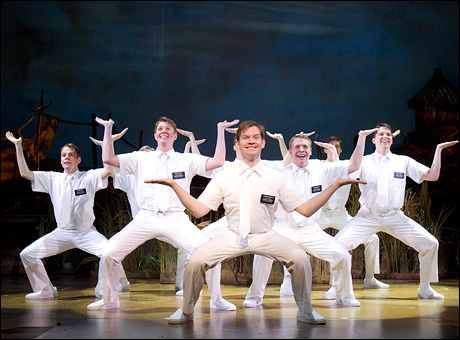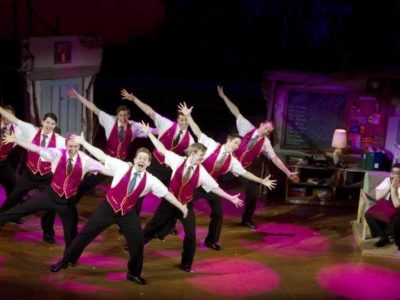If you’re a theatre major and you’re reading this, know that there’s a way to keep your momentum going after graduation – and that not all tap classes are bad. No, really. In this edition of “Theatre Talk,” I chatted with Carnegie Mellon University class of 2003 alum Rory O’Malley (“The Book of Mormon,” “The 25th Annual Putnam County Spelling Bee”) about all things college theatre – and beyond. 

CM: What was your main goal for yourself when you studied theatre in college? What did you hope to get out of your studies and experiences?
RO: “I wanted to be able to get very intense training…I [wanted to] start not just a career but a lifetime of learning [with] the basic tools to start my journey and learning my craft as an actor.”
CM: How do you handle competition in an environment like this, particularly at a school where so many actors start?
RO: “I think that it is very competitive, but it’s not competitive in the way that a lot of other careers are. I find it to be very competitive with myself, I feel like I make…constantly challenging myself. There’s a lot of other easier professions…you have to kinda make the decision to keep going because you love it, because you’re passionate about it. I try not to be competitive with other people, because if you compare yourself and where you are in your career to where others are, you can go crazy…You have to just constantly challenge yourself from where you are at that moment to: ‘What can I do to be more creative and to find more ways to do what I love?’”
“The truth is you have to like it when it’s really hard, you have to find a way to like it when you’re waiting on tables…and you’re auditioning and not getting any jobs…or you won’t like it when you’re on Broadway. A job isn’t going to come along that’s going to change your attitude, you have to change it now, in the present.”
CM: How are things different outside of school? That sounds like an obvious question, but what is the most significant difference when you step out of the school environment and into the “real-world” environment?
RO: “The most significant difference is your schedule not being given to you every day. It’s very different being an artist than most other professions because we have to create what our day is…structuring a day so that you are doing the most to make progress in your career. [In college] from 9am to 10pm at night, I had a schedule and shows and structures for 4 years…As soon as you graduate, all you do is think ‘What do I do next?’ That’s the scary thing. You just have to kinda take it day by day and give yourself a structure…make plans…be your own professor…”
CM: How have you applied what you learned in theatre school to your career? Any particular roles or examples where you used your skills?
RO: “For ‘Mormon’ I had to tap dance in that show (author’s note: said number is “Turn It Off,” in which his character Elder McKinley sings about suppressing some…urges) and I was not a dancer when I got to Carnegie Mellon. I pretty much was forced to take dance classes because that was part of my major. I just thought it was kinda a waste of time. I [thought] I would never be dancing on stage and that anyone would ever want me to dance. Well, low and behold, five years later, when we start working on Mormon, I’m told that my number is going to turn into a tap number, and thank God I had that experience of all that dance because I would have been way too afraid to even take on the challenge…I think taking the classes in school that you don’t think are necessarily your strong suit, but you never know when you’re gonna need them.”
CM: What is the most valuable thing you learned from your college theatre experience?
RO: “I think that something that I learned that I got there but it took me [the] years since I’ve left is to relax and let the universe kinda frame things to you, because you want to be able to have control in this business and life in general, but there is so little control that you have, that you have to kinda find a way to choose things in your day.”
CM: What tips would you give college theatre kids today who are studying or getting ready to go out into the world and audition?
RO: “Don’t wait to get permission from anyone to be good. Do not [do] just what you’re studying, do other parts of it. If you’re an actor, make sure you can write or direct. If you’re a director, make sure you can act. Find ways to throw yourself into all sides of the business…it will make you a stronger actor in turn. [Also] don’t worry about making everything happen right away. It takes time, it takes time to get to know people…you have to think about the long game. You go through so many different changes in your first year out of school and it can be very daunting. But you just need to keep at it and keep finding ways to do what you love. Do your own thing, make you own projects, make your own work.”




















